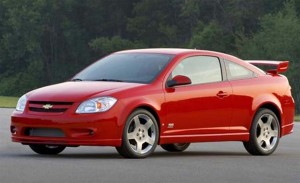Does the game of good cop/bad cop still work in Detroit? What happens when the bad cop (General Motors) keeps making bad decisions, and the good cop (Chevrolet) has no authority and no voice of its own?
In mid-March, the bad cop tried to dig out of its hole as new GM CEO Mary Barra met with reporters to discuss recent product recalls. “I want to start by saying how sorry personally and how sorry General Motors is for what has happened,” she said in reference to the accidents linked to faulty ignition switches.
I think we can all agree with Barra’s framing: this is a GM problem. Specifically, the inability of the company’s bureaucracy to deal with the ignition switch issue that was uncovered as early as 2001. One can study many things in this case, from GM’s internal crisis response to product quality to governance issues. What leapt to mind for me was GM’s devotion to being a “house of brands” that tries to isolate crises to a specific marque, or to the corporate level when the problem is found in multiple brands.
In reality it is no secret who manufactures Chevys, Buicks, or Cadillacs. GM wants to believe that the brands are autonomous, and that corporate problems are too obscure for consumers to notice. My great-grandfather, who ran a Chevrolet dealership, would be scratching his head at the current relationship GM has with its brands. Back in his day, the brands truly had equity—customers were more likely to identify as “Chevy people” instead of “GM people”. GM benefitted from ingenuity that originated in its confederation of car companies—the good cops. But now brands share space at dealerships, manufacturing facilities, chassis, and, occasionally, faulty ignition switches. Everyone has noticed except for the parent company, who still spends money trying to pretend that these brands are autonomous (pun not intended).
(Feinberg reveals announces GM victim’s compensation fund. Click Here for details.)
The current situation is damaging for all involved: Detroit is addicted to a brand strategy that simultaneously limits the potential of its products and allows reputation problems at the corporate level to fester. Because when you consider the products, they have been improving in quality since the financial crisis and near-implosion of the American auto industry. While quality and reliability of the products have improved, perceptions of GM are persistently low (GM doesn’t win quality awards, its brands do). And if the company is resolved to ignore lackluster perceptions of its citizenship, workplace, and governance (to name a few important areas), the lines will continue to be longer at Honda and Mercedes dealerships.
In the auto industry, many are obsessed with JD Power or with markers of distinction such as North American Car/Truck of the Year. And, granted, GM brands have accumulated several gold stars from these organizations over the past two years, as product quality has improved. But didn’t Detroit companies also accumulate these badges in the 1990s? They did. How about in the early 2000s? Yep (wake-up call: the PT Cruiser was Car of the Year in 2001). For Detroit, none of these product accolades won back the market dominance of the mid-20th century, nor did they prevent the financial mess of 2008–2009. It’s clear that JD Power awards will get you a momentary uptick in sales. But for long-term dominance, you need to get your enterprise in order. Products are indeed important, but how consumers perceived your company as a whole does more to dictate behavior.
(U.S. auto industry nears record number of recalls — and it’s only mid-year. Click Here to find out why.)
As years of Reputation Institute cross-industry data have shown, how consumers perceive your company as a whole does more to dictate behavior. Yet Detroit remains hopeful that brand loyalty trumps all other considerations. Ford and Chrysler play the game too. Consider Ford’s recent “Introducing the Lincoln Motor Company” campaign—the faux IPO of a company that hasn’t been a company since 1938. Consumers might fall prey to this “good cop” routine on occasion, but the balance is WAY off. That good cop/bad cop relationship between GM (or Ford, or Chrysler) and its brands: what would happen if Detroit changed it up? What if, instead of last year’s Chevy “Green” ad campaign, they had introduced some of the GM employees behind that effort (since no one gets a “Chevy” branded paycheck)?
(No more firings for botched ignition switch recall, says CEO Barra. Click Here for the latest.)
Eventually, Detroit could discover the symbiotic relationship between brand and parent that others in the industry already take to the bank. BMW and Mercedes (Daimler) know how to reap these rewards: their well-built cars drum up enthusiasm for the corporations of the same name, while the well-run enterprises that produce the cars keep stakeholders of all stripes engaged. No, brands are not without value, and I’m not advocating that the industry completely abandon its jailhouse routines—but the realization that the corporate character’s reputation is a key driver of business is long overdue in the Motor City.
Anthony Johndrow is a managing partner with the New York City-based Reputation Institute.

